|
by Jeff
Imbaro

Bill Whitsett thinks he isn’t
an artist, but he’s wrong. “There’s a big art scene here in Lowell,” he
explains. “When I first came here people said ‘Oh you’re an artist, you
fix guitars,’ but I don’t think of myself that way. I’m a mechanic.
Although I appreciate there’s a difference between this and fixing an
Oldsmobile.”
The truth is that Bill Whitsett is a craftsman. Part artist, part
mechanic, part doctor, part business man. But what impresses most about
Whitsett is not what he does, but how he goes about it.
“This business is about trust,” he says. “Guys have attachments to their
instruments. If someone’s gonna give you their cherished guitar, they
have to be able to trust you.”
The subject of trust comes up fairly early in a conversation with
Whitsett, sitting at his workbench in the Lowell shop he calls Whitsett
Guitar Works, at the end of a hallway in an old converted mill building.
Whitsett is keenly aware of how important trust is to his business, and
he attempts to earn it in many ways. “I try to bring honor to what I do.
If I do something wrong I don’t try to hide it or gloss over it.” He
tells the story of a rare accident when he chipped a customer’s prized
Les Paul while doing a custom pick-up job. “If you do thousands of
repairs, using power tools, you’re bound to make a mistake at some
point. The pick-ups were in, it sounded great, but I told him what
happened and gave it to him as a free job.”
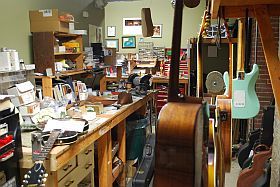 Sometimes
the trust is earned through not doing the job at all. “I can’t take $300
to fix a $200 guitar. I tell them their money’s better spent elsewhere.”
And although he’s certified to fix Taylors, Martins, Ovations, and
nearly every other guitar you can bring in, there is the occasional
instrument he doesn’t feel he can fix. “If I don’t feel I can do it
right, I won’t touch it.” Sometimes
the trust is earned through not doing the job at all. “I can’t take $300
to fix a $200 guitar. I tell them their money’s better spent elsewhere.”
And although he’s certified to fix Taylors, Martins, Ovations, and
nearly every other guitar you can bring in, there is the occasional
instrument he doesn’t feel he can fix. “If I don’t feel I can do it
right, I won’t touch it.”
Whether he’s fixing a guitar or declining to, the theme is the same:
honesty. “These old guys come in with their old Martins, that they
bought in the sixties and have played forever. Makes you feel a
responsibility to someone. I’m always gonna tell you what it’s really
gonna take to get your guitar back to where it was when you fell in love
with it.”
And people keep coming back. Like a barber who knows just how you like
your hair, his workshop is full of the guitars of repeat loyal
customers. “Everyone holds and strikes and plays a guitar differently.
Some guys I’ve known for years, and I know what they’re looking for.”
“I want to believe that my customers are my friends, to a certain
extent. I want to believe there’s some loyalty there. I take it very
personally. I want my customers to be happy. I want to do a good enough
job that it doesn’t occur to them to go somewhere else."
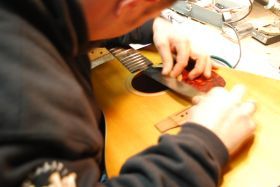 Whitsett
never forgets that his job is about getting musicians back to their
music. “Making people happy with their equipment, that’s a good feeling.
People play guitar because they’ve got something in them. Whether it’s
musical or spiritual. Whatever drives people to play guitar, whatever
drives people to art. People play music because they’ve got something in
them, and I’m helping them to get it out. Letting them focus on the
music rather than wrestling the instrument.” Whitsett
never forgets that his job is about getting musicians back to their
music. “Making people happy with their equipment, that’s a good feeling.
People play guitar because they’ve got something in them. Whether it’s
musical or spiritual. Whatever drives people to play guitar, whatever
drives people to art. People play music because they’ve got something in
them, and I’m helping them to get it out. Letting them focus on the
music rather than wrestling the instrument.”
Whitsett didn’t start his career fixing guitars until he was thirty, but
his roots in fixing things himself start early. “We grew up incredibly
poor. If there was a plumbing issue you were a plumber, if there was an
electrical issue you were an electrician.”
Born in North Carolina, Whitsett has lived all over the country. His
parents split up when he was a kid, and it lead to his moving around a
lot. “I didn’t go to the same school more than two years in a row until
I got to high school.” At thirteen he ended up in Massachusetts in the
North Shore seaside town of Rockport. Talking to him now, you can see he
has the easy way about him that someone has when they’ve been forced to
make new friends often from an early age.
Rockport was a sunny shock to the young Whitsett. “It was a fun place. I
had a lot of freedoms and I didn’t handle them very well. I wasn’t
making good decisions.”
Sometimes he thinks of the young version of himself when he’s fixing
guitars for kids who are just learning to play. “I get a great deal of
satisfaction doing work for kids. Maybe music could help that kid, save
him from choosing something else. Some say music keeps kids off drugs,
but I don’t know about that. It didn’t work for me.”
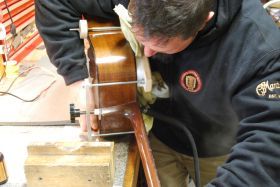 The
way Whitsett tells, his fun and aimless teen years slipped into his fun
and aimless twenties. But when the winds brought him to Vermont, he was
introduced to guitar, by Phish frontman Trey Anastasio, of all people.
Whitsett makes clear that the meeting was brief, it was a very very long
time ago, the two never really knew each other and they certainly don't
know each other now, but the story does serve to highlight the
interesting range of people Whitsett has met along the way. Whitsett had
just moved in with a girl who had just broken up with Anastasio, but
he’d still come around. Although they were never close, they would play
guitar around the house occasionally, and it was Anastasio that taught
Whitsett to tune a guitar. The
way Whitsett tells, his fun and aimless teen years slipped into his fun
and aimless twenties. But when the winds brought him to Vermont, he was
introduced to guitar, by Phish frontman Trey Anastasio, of all people.
Whitsett makes clear that the meeting was brief, it was a very very long
time ago, the two never really knew each other and they certainly don't
know each other now, but the story does serve to highlight the
interesting range of people Whitsett has met along the way. Whitsett had
just moved in with a girl who had just broken up with Anastasio, but
he’d still come around. Although they were never close, they would play
guitar around the house occasionally, and it was Anastasio that taught
Whitsett to tune a guitar.
Later, the winds took Whitsett to Florida, where he lived with a new
wife. Days were spent working for various animal charities, nights were
spent in bars playing cover tunes for strangers. It stayed fun for a
long time, but he knew it wasn’t taking him anywhere. “I kept thinking
that if I fall off this stool while playing some Jimmy Buffet tune, they
would just push me off and no one would know I was there, and I’d never
be missed.”
His thirtieth birthday was staring him in the face, and life wasn’t
moving forward. “When I was a kid I was a fuck-up. When I was thirty
years old I was a fuck-up. I was really unhappy, and I needed a change.”
Then, after another night of hard partying, it hit him: fixing guitars.
“I’m not a struck-by-lightening-epiphany kind of guy, but I literally
woke up in bed one morning and said this is what I’ve got to do,” he
explains. He found a guitar school a thousand miles away and decided he
needed to go. “Two weeks later got on a plane and went there and have
been doing it ever since.” The marriage didn’t survive the sudden
change, but doing so may have saved his life. “I was going to be dead.
Dead or in jail.”
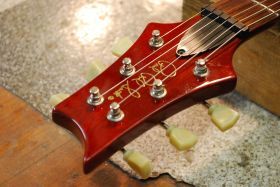 The
commitment to the idea might have been sudden, but the concept had been
brewing in his mind for years. “I’d always had decent guitars. But it’s
very difficult to find people who could fix both acoustic and electric.
I wanted to learn how to do both. I figured if I could do 75% of both
jobs that I would be twice as good as everybody else I knew that was
doing either one.” The
commitment to the idea might have been sudden, but the concept had been
brewing in his mind for years. “I’d always had decent guitars. But it’s
very difficult to find people who could fix both acoustic and electric.
I wanted to learn how to do both. I figured if I could do 75% of both
jobs that I would be twice as good as everybody else I knew that was
doing either one.”
Whitsett spent years learning his craft, first at the renowned Bryan
Galloup School and then later as an apprentice to Exeter, NH master
Patrick DiBurro. These are the men he still thinks of when he’s
performing his work. “I never worry about the customer. I know they’re gonna like the job. I’m more concerned about the next repair shop. If my
work ends up in Patrick’s hands, I know he’s gonna take a close look,
and give me a hard time if something was wrong. We still talk every
day.”
Has anything ever ended up in DiBurro’s hands that he thought was done
wrong? “Not yet.”
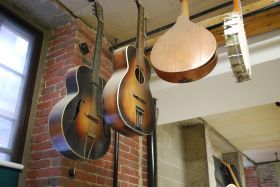 In
the twelve years since that fateful decision, he’s come a long way. In
the early years, he’d work out of a fishing-tackle toolbox. These days
he does his work in a fully-equipped workshop. The toolbox still sits
under one of the worktables. In
the twelve years since that fateful decision, he’s come a long way. In
the early years, he’d work out of a fishing-tackle toolbox. These days
he does his work in a fully-equipped workshop. The toolbox still sits
under one of the worktables.
Above the main workbench hangs a photo of an ultrasound, the first
picture of his now one-year old daughter. She and her mother are what
Whitsett works so hard for now, and he doesn’t take it for granted.
“I’ve very lucky. I have a house, and a family and a job. I wear jeans
when I go to work and I get to talk to people. I’ve met some great
people.”
And he doesn’t look at those “lost years” with any regret. “Sometimes I
wish I’d started ten years earlier. But if I had done anything different
than I did, I wouldn’t be sitting here now. I was supposed to go through
all that crap. Everybody travels through life, and mine’s been pretty
crazy. I have a responsibility that I take very seriously: a family to
provide for.”
In a business based on trust, there’s no opportunity to get too
comfortable. “This is a very
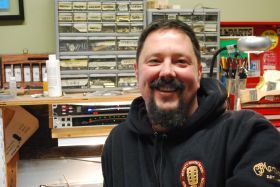 difficult
business to make a living at. I’m proud of the fact that I do something
well enough for people to come here, and more importantly that they’ll
come back. Anyone can take your money once, the trick is doing what you
do well enough for people to want to come back.” difficult
business to make a living at. I’m proud of the fact that I do something
well enough for people to come here, and more importantly that they’ll
come back. Anyone can take your money once, the trick is doing what you
do well enough for people to want to come back.”
And as long as they keep coming back, Whitsett will be there to get
their instrument back to top shape. “I don’t think I’ll ever be so good
at it that I quit learning. As long as my job keeps stimulating me
intellectually and creatively.”
When asked if there is anything else that he would like to do if he
couldn’t fix guitars, he can’t think of anything.
“I do what I do. Most people don’t like being defined by what they do,
but I have absolutely no problem with it. If this is the definition of
who I am as a person, that’s fine. I fix instruments for people so they
can make music.”

To learn more about Whitsett Guitar Works,
visit online at
http://www.whitsettguitarworks.com/index.htm
|